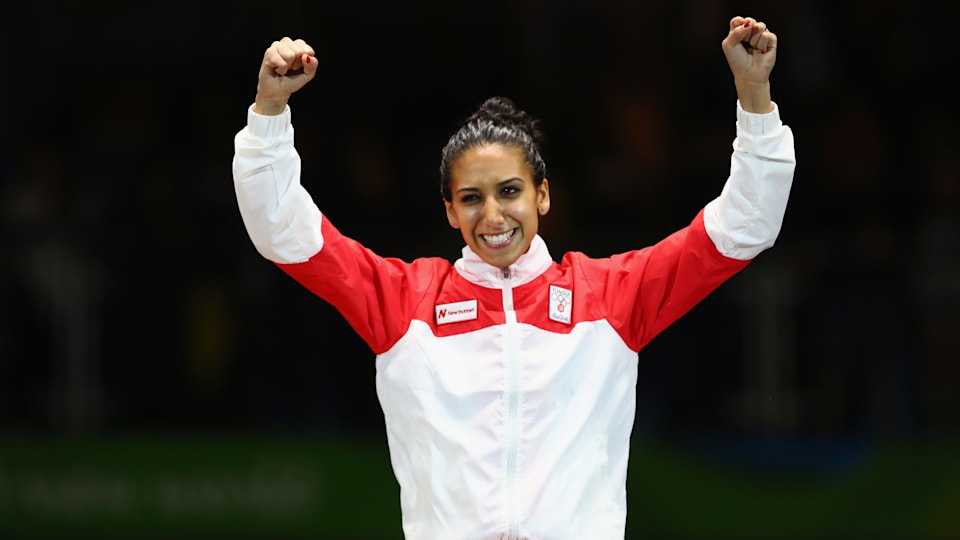Ines Boubakri: Five things to know about Tunisia's inspiring fencer
The 32-year-old made history for Tunisia at Rio 2016 by winning her country's first ever Olympic fencing medal. But did you know that she's a qualified PE teacher and she's a champion for Arab women's empowerment?

No African woman had ever won an Olympic medal in fencing before Ines Boubakri took foil bronze at Rio 2016.
The now 32-year-old Tunisian joined a select number of athletes from her country, just eight (and only three are women), who stepped on the podium during a Games.
"I started from nothing. I'm not like French or Russian fencers who have financial support," Boubakri told Olympics.com during the 2019 African Games in Rabat, Marocco, where she conquered her fifth continental title.
"I have showed that you can achieve your dreams even without the means," she added.
The left-handed fencer will take part in her fourth Olympics at Tokyo 2020, chasing that gold medal that so far has eluded her.
Here are five things you may not know about Tunisia's fencing trailblazer.
A family of fencers
"My family are all athletes, my husband is an athlete. That have motivated me in my fencing journey," Boubakri said.
Her mother, Henda Zaouali, is a retired fencer who competed at the Olympics in Atlanta in 1996.
Ines started to train with "her idol and inspiration" at the age of five, before changing coach when she was 13.
"Over time the mother-daughter relationship started to get tense, so she stepped aside," she revealed.
Due to the lack of opportunities to develop in her country, at 19 years old the Tunisian moved to France, where she joined the Bourg-la-Reine club, in the suburbs of Paris.
During a fencing training camp in 2005, she met French fencer Erwann Le Pechoux, who became her husband in August 2014, one month after clinching her first medal at the World championships in Kazan.
Le Pechoux, a four-time world champion, won a silver team medal for France at Rio 2016 just two days after Ines' bronze.
A future in coaching?
Boubakri is a certified PE teacher and has a Masters in sports psychology.
“I’m a person who wants to live other things, because I’m not getting a lot of money from fencing. So as an independent woman, I have diplomas and I want to make another career in something else, " she told TheNationalNews.
With the end of her competitive career approaching, she recently disclosed plans to open her own coaching academy either in Tunisia or in the Middle East, where she spent most her time when there was no place for her to train in France due to the pandemic.
The 32-year-old continued her preparation in the UAE and in Abu Dhabi, and has also been treating a niggling knee injury at the FIFA Medical Centre of Excellence in Dubai.
Ines has already tested her coaching skills with some younger fencers in Paris.
Inspiring young Arab women
Winning an Olympic medal in Rio wasn't just a personal sporting achievement for Ines.
It was also a way to send out a strong message to all the young women in the Arab world:
"It was a source of pride to show young women that everything is possible," she said.
"As an Arab woman, I’d love to encourage the young girls in this region to strive to reach a high level.”
Ines admitted that after Rio many girls have reached out to her on social media, sending questions and asking for advice.
"I’ve seen a lot of girls in Arab countries who fell in love with fencing and wanting to train. That makes me happy."
Addicted to social media
"What really bothers me about Ines is the fact that she's constantly on her phone," her husband confessed.
In their episode in the Olympic Channel's original series 'A Game for Two', even the Rio 2016 bronze medallist admitted to be "addicted to social media."
Boubakri has almost 60,000 followers on Facebook and she loves to engage with her fans online, also documenting her training progress.
Knowing her 'addiction', Le Pechoux had an idea to do his marriage proposal by asking all her friends (almost 200) to change their profile image with, "Say yes," "Keep calm and say yes."
At first the Tunisian was confused, and even woke up during the night to check her phone and look if there was any viral campaign going on.
In the end Erwann decided to be more explicit and convinced her with...a puzzle: "Would you marry me?" was written in the last few pieces missing to complete it.
And she said yes...but didn't give up her phone!
Showing emotions
Away from the fencing piste, Boubakri is described as a shy and soft-spoken woman.
But in competition mode, the Olympic medallist literally transforms herself and shows all her emotions with screams and fist pumps.
And she's not afraid to confront her opponents and the referees.
"When I enter a competition, I'm more aggressive. I've been like this since I was a kid," she said.
"My mum was the same, she was aggressive and loved winning, she was very passionate with fencing and I feel like that came to me naturally."
Her fiery celebration after defeating Aida Shanaeva in the Rio 2016 bronze final became iconic, but she explained what's behind her emotional reactions during competitions:
“That helped me a lot through many difficulties I faced in the sport of fencing. As an Arab, as an African, as a woman, coming from a country with no fencing culture, you have to prove yourself."
